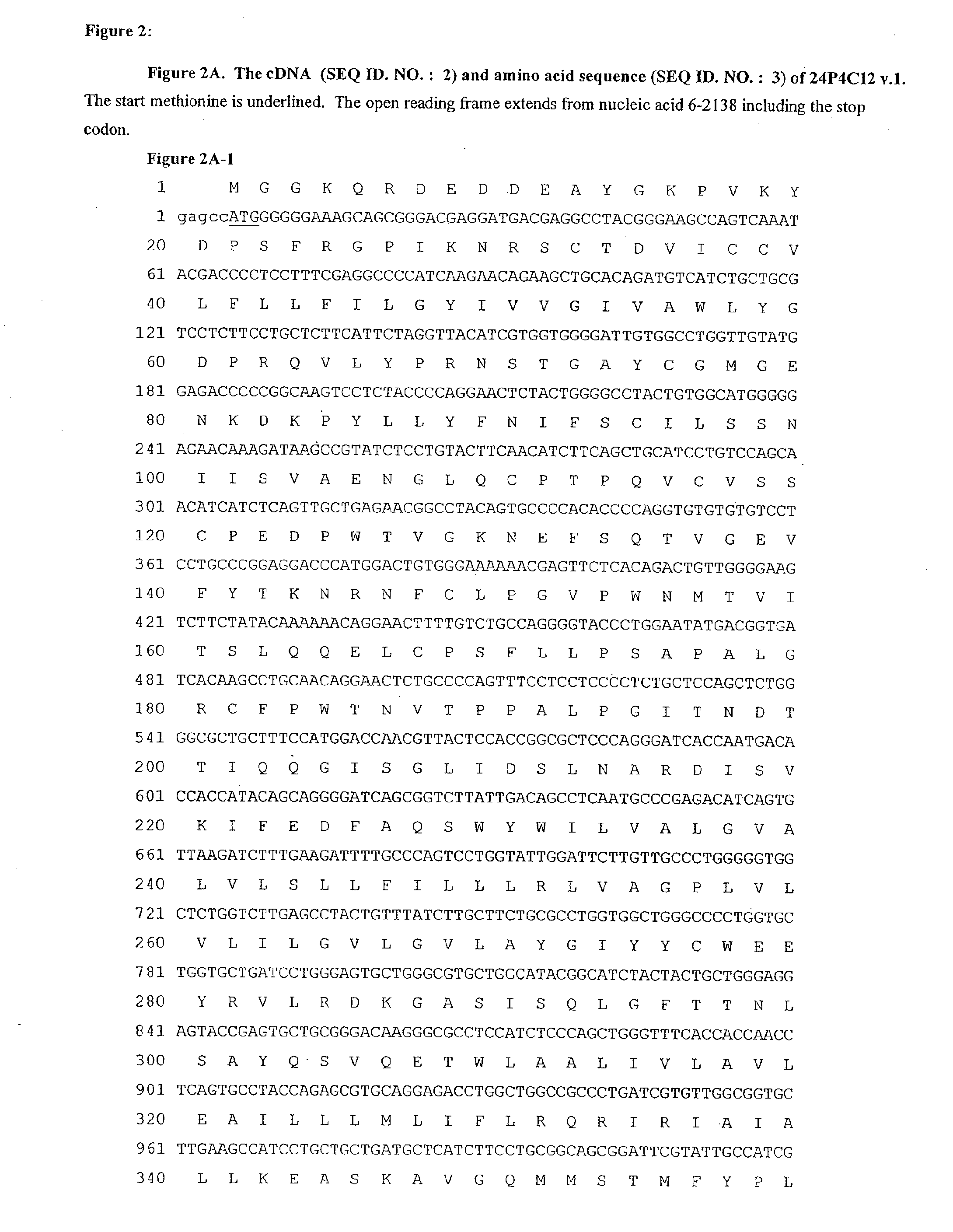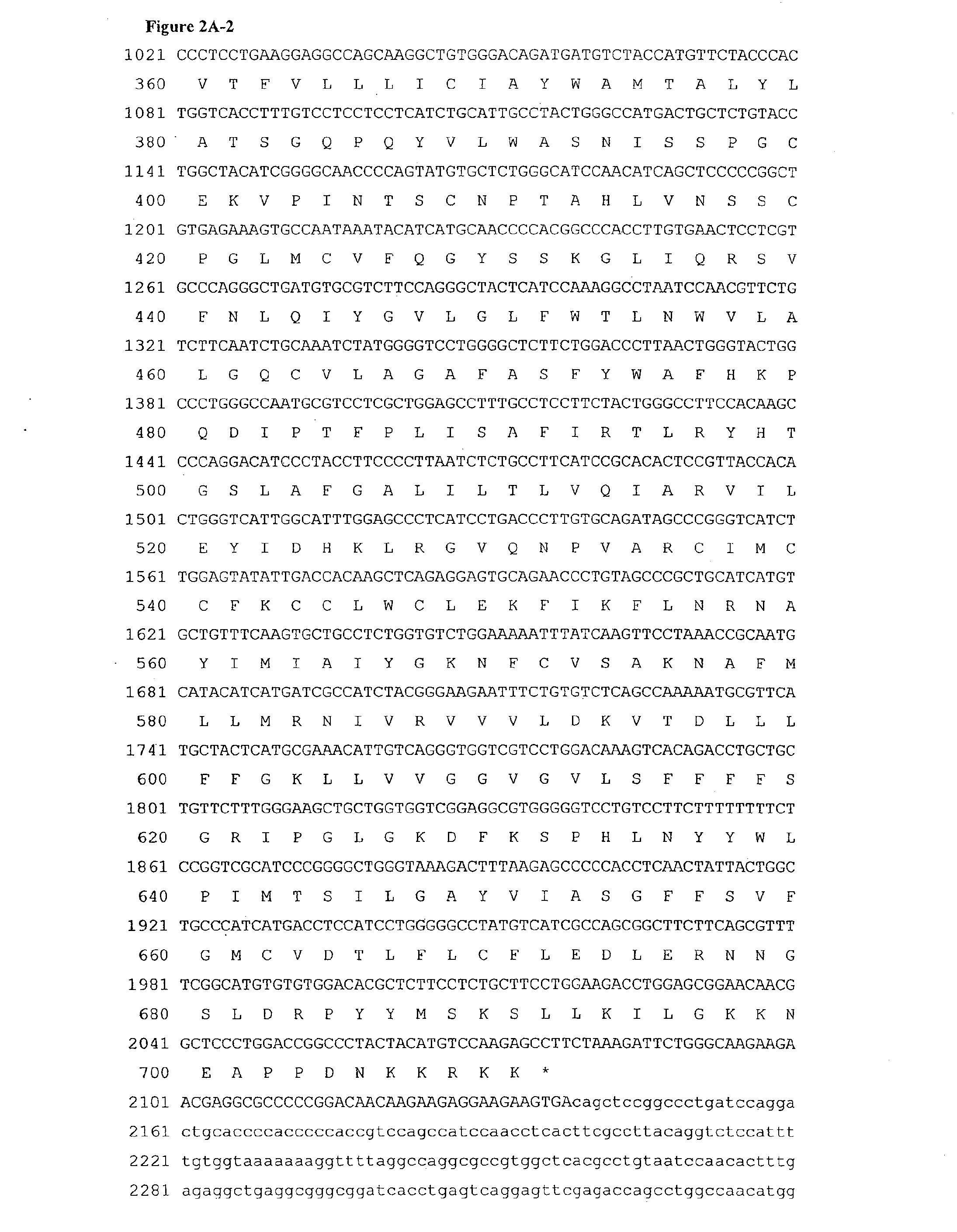Antibodies to tumor associated proteins
a technology of tumor associated proteins and antibodies, which is applied in the field of antibodies to tumor associated proteins, can solve the problems of ineffective treatment of many patients, undesirable consequences, and still no effective treatment for metastatic prostate cancer
- Summary
- Abstract
- Description
- Claims
- Application Information
AI Technical Summary
Benefits of technology
Problems solved by technology
Method used
Image
Examples
example 1
SSH-Generated Isolation of cDNA Fragment of the 24P4C12 Gene
[0607]Suppression Subtractive Hybridization (SSH) was used to identify cDNAs corresponding to genes that may be differentially expressed in prostate cancer. The SSH reaction utilized cDNA from the LAPC-9 AD prostate cancer xenograft. The gene 24P4C12 was derived from an LAPC-9 AD minus benign prostatic hyperplasia experiment.
[0608]The 24P4C12 SSH cDNA of 160 bp is listed in FIG. 1. The full length 24P4C12 cDNAs and ORFs are described in FIG. 2 with the protein sequences listed in FIG. 3.
[0609]Materials and Methods
[0610]Human Tissues:
[0611]The patient cancer and normal tissues were purchased from different sources such as the NDRI (Philadelphia, Pa.). mRNA for some normal tissues were purchased from Clontech, Palo Alto, Calif.
[0612]RNA Isolation:
[0613]Tissues were homogenized in Trizol reagent (Life Technologies, Gibco BRL) using 10 ml / g tissue isolate total RNA. Poly A RNA was purified from total RNA using Qiagen's Oligotex...
example 2
Isolation of Full Length 24P4C12 Encoding cDNA
[0637]The 24P4C12 SSH cDNA sequence was derived from a substraction consisting of LAPC-4AD xenograft minus benign prostatic hyperplasia. The SSH cDNA sequence (FIG. 1) was designated 24P4C12.
[0638]The isolated gene fragment of 160 bp encodes a putative open reading frame (ORF) of 53 amino acids and exhibits significant homology to an EST derived from a colon tumor library. Two larger cDNA clones were obtained by gene trapper experiments, GTE9 and GTF8. The ORF revealed a significant homology to the mouse gene NG22 and the C. elegans gene CEESB82F. NG22 was recently identified as one of many ORFs within a genomic BAC clone that encompasses the MHC class III in the mouse genome. Both NG22 and CEESB82F appear to be genes that contain 12 transmembrane domains. This suggests that the gene encoding 24P4C12 contains 12 transmembrane domains and is the human homologue of mouse NG22 and C. elegans CEESB82F. Functional studies in Ce. elegans may r...
example 3
Chromosomal Mapping of 24P4C12
[0640]Chromosomal localization can implicate genes in disease pathogenesis. Several chromosome mapping approaches are available including fluorescent in situ hybridization (FISH), human / hamster radiation hybrid (RH) panels (Walter et al., 1994; Nature Genetics 7:22; Research Genetics, Huntsville Ala.), human-rodent somatic cell hybrid panels such as is available from the Coriell Institute (Camden, N.J.), and genomic viewers utilizing BLAST homologies to sequenced and mapped genomic clones (NCBI, Bethesda, Md.). 24P4C12 maps to chromosome 6p21.3 using 24P4C12 sequence and the NCBI BLAST tool located on the World Wide Web at (.ncbi.nlm.nih.gov / genome / seq / page.cgi?F=HsBlast.html&&ORG=Hs).
PUM
| Property | Measurement | Unit |
|---|---|---|
| bioluminescent | aaaaa | aaaaa |
| chemiluminescent | aaaaa | aaaaa |
Abstract
Description
Claims
Application Information
 Login to View More
Login to View More - R&D
- Intellectual Property
- Life Sciences
- Materials
- Tech Scout
- Unparalleled Data Quality
- Higher Quality Content
- 60% Fewer Hallucinations
Browse by: Latest US Patents, China's latest patents, Technical Efficacy Thesaurus, Application Domain, Technology Topic, Popular Technical Reports.
© 2025 PatSnap. All rights reserved.Legal|Privacy policy|Modern Slavery Act Transparency Statement|Sitemap|About US| Contact US: help@patsnap.com



